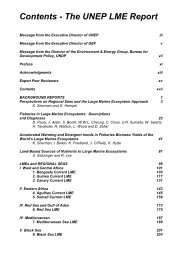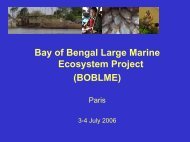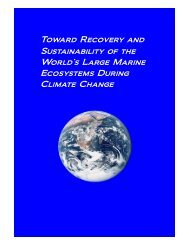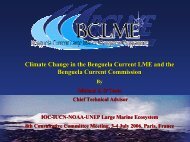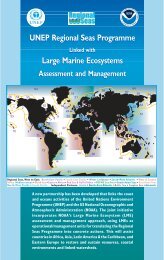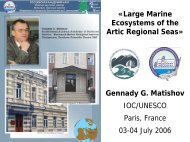Sustaining the World's Large Marine Ecosystems
Sustaining the World's Large Marine Ecosystems
Sustaining the World's Large Marine Ecosystems
Create successful ePaper yourself
Turn your PDF publications into a flip-book with our unique Google optimized e-Paper software.
In 2007, <strong>the</strong> LME Program Office and <strong>the</strong> GEF supported UNDP International<br />
Waters Learn project produced a DVD, “Turning <strong>the</strong> Tide—<strong>Sustaining</strong> Earth’s<br />
<strong>Large</strong> <strong>Marine</strong> <strong>Ecosystems</strong>,” which describes <strong>the</strong> uncontrolled use of <strong>the</strong> oceans<br />
and counters this message by describing <strong>the</strong> GEF-LME global movement<br />
supporting an upward spiral of actions aimed at recovery and sustainability of<br />
ocean resources.<br />
The DVD delivers a description of <strong>the</strong> LME approach. The narration states that,<br />
around <strong>the</strong> world, <strong>Large</strong> <strong>Marine</strong> <strong>Ecosystems</strong> provide over 80% of <strong>the</strong> marine fish<br />
that humans consume. The uncontrolled use of large-scale industrialized vessels<br />
has put nine of <strong>the</strong> World’s seventeen major fishing grounds in serious decline.<br />
The demand for marine protein has devastated marine resources. Nitrogen<br />
overenrichment of LMEs is increasing. <strong>Marine</strong> mammals are in trouble, and coral<br />
reefs are threatened. However, <strong>the</strong>re is hope for a common global<br />
understanding of how to address <strong>the</strong> world wide crisis of marine life degradation.<br />
Pioneering work by lead scientists has identified 64 <strong>Large</strong> <strong>Marine</strong> <strong>Ecosystems</strong><br />
(LMEs) determined by ecological functionality and physical parameters ra<strong>the</strong>r<br />
than political boundaries. The <strong>Large</strong> <strong>Marine</strong> Ecosystem approach blends science<br />
and stewardship to reduce coastal pollution, restore damaged habitats, and<br />
recover depleted fisheries.<br />
The Global Environment Facility (GEF) assists developing countries working<br />
toge<strong>the</strong>r in planning and implementing LME projects. The DVD includes<br />
comments by Dr. Alfred Duda, Senior Advisor for <strong>the</strong> International Waters focal<br />
area of <strong>the</strong> GEF, Dr. Kenneth Sherman on <strong>Large</strong> <strong>Marine</strong> <strong>Ecosystems</strong>, and Dr.<br />
Biliana Cicin-Sain, Director of <strong>the</strong> Global Forum on Oceans, Coasts and Islands,<br />
and footage of <strong>the</strong> Benguela Current, Antarctic, Agulhas and Somali Currents,<br />
Humboldt Current, and Baltic Sea LMEs.<br />
The DVD has been screened in elementary, middle and high school classrooms<br />
on <strong>the</strong> American continent and in Africa. The following quotes are taken from<br />
student comments.<br />
“I already knew that <strong>the</strong> oceans were in trouble, but <strong>the</strong> movie still taught me a lot.<br />
I learned about different types of pollution. I didn’t know about <strong>the</strong> GEF. I think it’s a<br />
great program, because thanks to your movie, I saw how <strong>the</strong> group is saving <strong>the</strong> world.<br />
“In <strong>the</strong> movie ‘Turning <strong>the</strong> Tide’, I liked how <strong>the</strong> videography started out very peacefully,<br />
and beautifully, gets to <strong>the</strong> less beautiful clips toward <strong>the</strong> middle, and by <strong>the</strong> end, <strong>the</strong><br />
videography became peaceful and beautiful. I liked how <strong>the</strong> videography went in that<br />
order because: since it didn’t begin with <strong>the</strong> less beautiful, pollution parts, it didn’t lead<br />
<strong>the</strong> watchers to thinking <strong>the</strong> entire video would show only those clips. If you ended with<br />
<strong>the</strong> pollution parts, it would lead <strong>the</strong> reader to remembering those parts most. The order<br />
was brilliant. “All in all, I loved <strong>the</strong> movie. It was <strong>the</strong> best science movie I have ever<br />
seen.” (school student, Wakefield, Rhode Island, USA).<br />
“This movie taught me a lot and that’s quite a bit to say because my dad is a<br />
fisherman and one of my two bro<strong>the</strong>rs adores everything that’s alive and protecting<br />
those things. He knows very much about <strong>the</strong>m. One thing I learned from “Turning <strong>the</strong><br />
122



